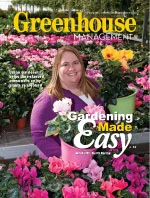|
 The opportunity to capture small niches, which are typically ignored, may be the key to business survival. Photo by Todd Johnson, Oklahoma State UniversityCompanies and products need to “move with the culture” to compete in today’s marketplace, according to Trendwatching.com. This can be anything from products for small urban gardens to education for new gardeners. The opportunity to capture small niches, which are typically ignored, may be the key to business survival. Photo by Todd Johnson, Oklahoma State UniversityCompanies and products need to “move with the culture” to compete in today’s marketplace, according to Trendwatching.com. This can be anything from products for small urban gardens to education for new gardeners.
Whatever you are producing or selling in 2011, it needs to be viewed from the paradigm of the ever-changing consumer. In a marketplace where nearly everything is available everywhere and at nearly any time of the day, the opportunity to capture small niches, which are typically ignored, may be the key to business survival.
Trend No. 1: Grow and sell plants that matter to me
The year 2010 marked the first time in the world’s history that more people lived in cities rather than rural areas. There is now a stronger demand for smaller homes and an increased population in downtown and inner suburb growth. Baby boomers are looking to simplify and lower the necessary maintenance of their homes and yards.
Instead of planting large gardens, today’s typical gardener hangs a couple of baskets, puts a few containers together and possibly plants a few items in the ground. In newly established residential subdivisions, in-ground plantings are scarce. The pressure to not mess up a professionally landscaped area that has no place for annuals and perennials is intense. The garden has shrunk considerably, so plantings are relegated to the back of the house where “errors” are less noticeable.
We all saw the popularity of ipomoea take off in the late 1990s. It was the perfect plant that offered tremendous color without flower cycles and made everyone look successful. Perhaps too successful, as the plants gobbled up everything planted with it. Breeders took on the challenge of creating a new ipomoea that played nice with other plants. We’ve also seen changes reflected in other crops such as angelonia.
The plants that once provided the most comfort and reassurance of a green thumb are those that are vigorous. However, these may not be suitable plants for tomorrow’s urban gardener. And we’ve not even discussed the scarcity of water.
Therefore, the work of breeders and collectors may shift away from finding the most vigorous plants to developing more compact plants that grow quickly and require less water, such as award-winning plants Diamond Frost euphorbia and Lo & Behold Blue Chip buddleia.
The need to promote small-space gardening is evident. Do you have a list of plants to recommend to condo dwellers, or balcony hobbyists or first-time gardeners with a 2-foot square garden? Consumers are looking to us for solutions to their unique gardening needs.
Trend No. 2: Listen to me
Are you making all the decisions for your business, or is your customer? Are you still trying to hang onto those habits of yesteryear? Are you running the family business just like your parents did? Are you tweaking gradually or allowing radical change to transform your products and your business into something that is sought?
In the new economy this old type of thinking leads nowhere. Today your business and its products need to embrace your customers. Occasionally we give customers a hug, but seriously, does your customer feel great about your company? Most business owners don’t even know — mainly because they don’t ask or provide a reasonable forum for customer feedback. Sorry to say, but suggestion boxes don’t work — our own employees even ignore them. It takes guts to allow customers to make your decisions.
Customers, however, are making judgments all the time, but now they are doing it so everyone online can hear. Blogs, Yelp, Facebook — our customers are all there. Unfortunately, unless given the opportunity to provide direct feedback, those with experiences to share will find a way to do exactly that.
Does your company have a fan club that acts as a consumer advisory board (helping you make decisions on what to grow next year, guiding your facility layout and signage, attending important trade shows with you)? Do you have a method for asking your customers questions and measuring their feedback?
In a recent exit survey of garden center shoppers conducted by Nichols Research Inc., 71 percent of respondents, ages 18-44, want a trusted brand, compared with just 35 percent in the 45+ age bracket. Your product offering needs to reflect the trends that research is pointing out in today’s society.
Listening is a challenge, but extremely valuable when applied. When heard, the public’s desire to get involved increases, and thus empowerment and the ability to avoid mistakes become key attributes to running a successful business.
Avoiding a $1 million mistake
 A couple of years ago Proven Winners created an ad promoting their new Rockapulco double impatiens series. Just before running the ad in national consumer publications, Proven Winners decided to ask consumers their opinion of the ad. The results were overwhelming. They absolutely loved the design, but they hated the color red. A follow-up survey was immediately conducted asking female gardeners’ what was their favorite flower color. Red was their sixth choice. Purple was No. 1. A $1 million mistake was avoided by simply asking a question. A couple of years ago Proven Winners created an ad promoting their new Rockapulco double impatiens series. Just before running the ad in national consumer publications, Proven Winners decided to ask consumers their opinion of the ad. The results were overwhelming. They absolutely loved the design, but they hated the color red. A follow-up survey was immediately conducted asking female gardeners’ what was their favorite flower color. Red was their sixth choice. Purple was No. 1. A $1 million mistake was avoided by simply asking a question.
 This was a sobering reminder of who should be making the decisions. Today, Proven Winners enlists gardeners to name and rate plants, choose ad layouts/designs, vote on potential television commercials and packaging ideas, as well as providing the opportunity to comment on every page of its website. Proven Winners also is engaging and listening to more than 30,000 consumers via Facebook every day of the week. This was a sobering reminder of who should be making the decisions. Today, Proven Winners enlists gardeners to name and rate plants, choose ad layouts/designs, vote on potential television commercials and packaging ideas, as well as providing the opportunity to comment on every page of its website. Proven Winners also is engaging and listening to more than 30,000 consumers via Facebook every day of the week.
Are you listening? I hope so, because your customers want to tell you something. |
Marshall Dirks is director of marketing, Proven Winners; marshall@provenwinners.com; www.provenwinners.com.
|


 A couple of years ago Proven Winners created an ad promoting their new Rockapulco double impatiens series. Just before running the ad in national consumer publications, Proven Winners decided to ask consumers their opinion of the ad. The results were overwhelming. They absolutely loved the design, but they hated the color red. A follow-up survey was immediately conducted asking female gardeners’ what was their favorite flower color. Red was their sixth choice. Purple was No. 1. A $1 million mistake was avoided by simply asking a question.
A couple of years ago Proven Winners created an ad promoting their new Rockapulco double impatiens series. Just before running the ad in national consumer publications, Proven Winners decided to ask consumers their opinion of the ad. The results were overwhelming. They absolutely loved the design, but they hated the color red. A follow-up survey was immediately conducted asking female gardeners’ what was their favorite flower color. Red was their sixth choice. Purple was No. 1. A $1 million mistake was avoided by simply asking a question. This was a sobering reminder of who should be making the decisions. Today, Proven Winners enlists gardeners to name and rate plants, choose ad layouts/designs, vote on potential television commercials and packaging ideas, as well as providing the opportunity to comment on every page of its website. Proven Winners also is engaging and listening to more than 30,000 consumers via Facebook every day of the week.
This was a sobering reminder of who should be making the decisions. Today, Proven Winners enlists gardeners to name and rate plants, choose ad layouts/designs, vote on potential television commercials and packaging ideas, as well as providing the opportunity to comment on every page of its website. Proven Winners also is engaging and listening to more than 30,000 consumers via Facebook every day of the week.




